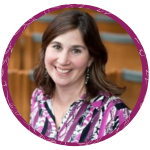
Dear friend,
Curiosity. Curiosity of mind inspired my registration for a trip to the South Hebron Hills this summer with T’ruah: The Rabbinic Call for Human Rights.
I arrived ready to witness and learn, particularly motivated to learn more about the disproportionate impact the climate crisis has on the occupied Palestinian territories and to bring what I learned back to my community.


The stark message presented by T’ruah’s partner, One Climate, pierced my heart. Land grabbing, inability to cultivate the land, and limited water access ruin natural habitats. The vulnerable conditions of people, animals and our planet foster climate injustice.
In the threatened Palestinian village of Susya, we learned just how difficult it is to access water. Israeli authorities refuse to connect Palestinian homes to the grid, leaving them dependent on cisterns to collect limited rainfall. Refused connection to these water pipelines and the infrastructure enjoyed even by unauthorized Israeli settlements, children, families, and animals are denied a basic need: water.
The horrific story of settlers pushing a car into a well to contaminate and add toxicity to the water remains with me. This act of settler violence designed to bully a people into flight from their home adds to the dehumanization.


The disparity between access to water in this space amplifies the crisis of oppression faced by Palestinians and the inhumanity of climate injustice. How can anyone denied proper access to water live physically or spiritually? How does one build resilience in the everyday and the long term when subject to cruelty and refusal of the most basic rights?
Our guide from One Climate reminded us we are not all in the same boat. The gaps are vast. We are in the same storm. It is on us to navigate uneven waters. The ecosystems of the land and our humanity are at stake.
Curiosity led me to the South Hebron Hills this summer. Curiosity leads to engagement.
As a T’ruah rabbi and member of the chaverim network, I bring renewed empathy and hope that we can lift up injustice and infuse our efforts with the sustenance necessary to create equanimity and end occupation in the West Bank.
I hope you will join me in supporting T’ruah’s important work bringing rabbis like me to witness the occupation firsthand with a Rosh Hashanah gift today.
Shana tova,
Rabbi Lisa Gelber (she/her)
Congregation Habonim, NY, NY
